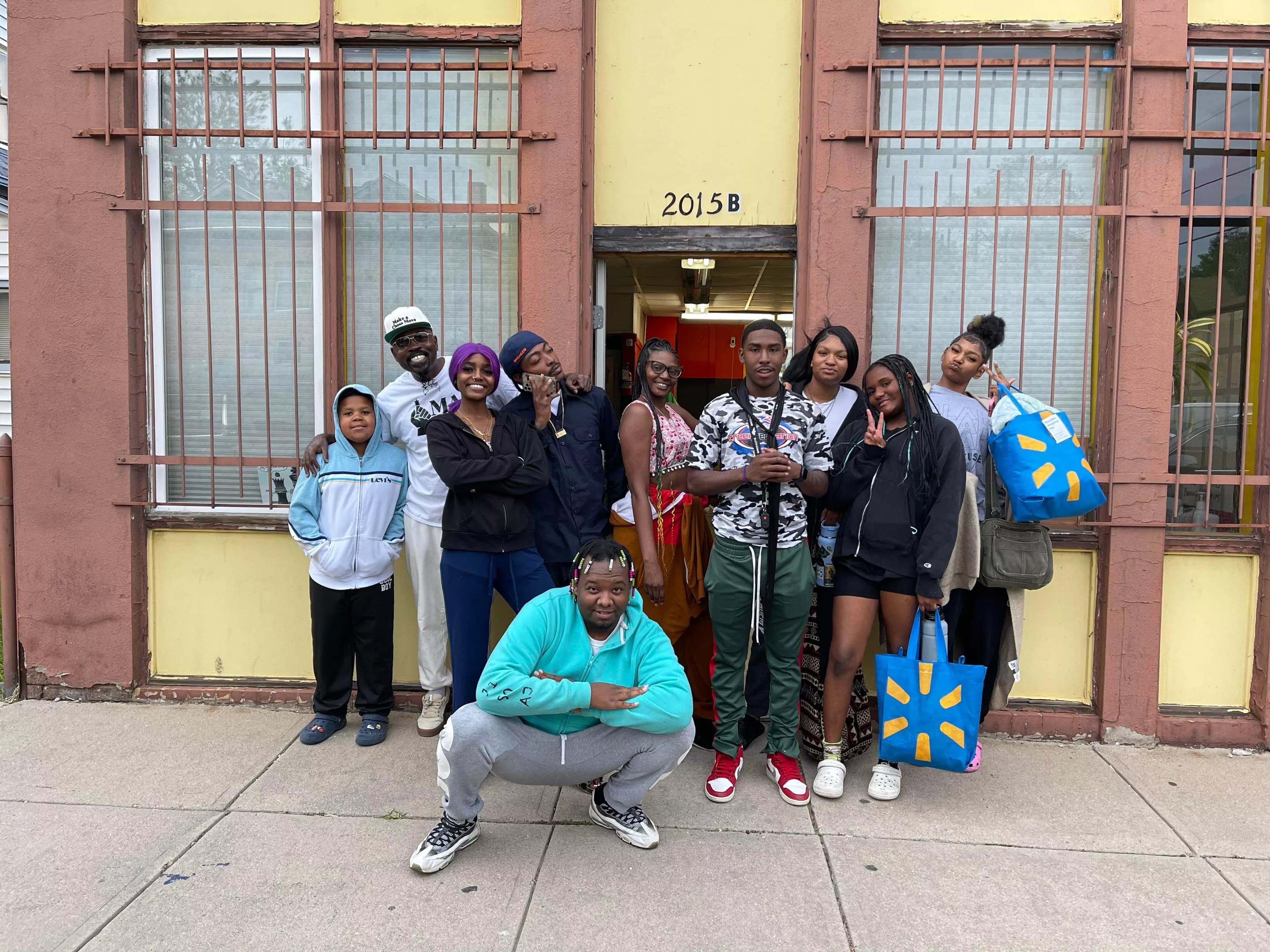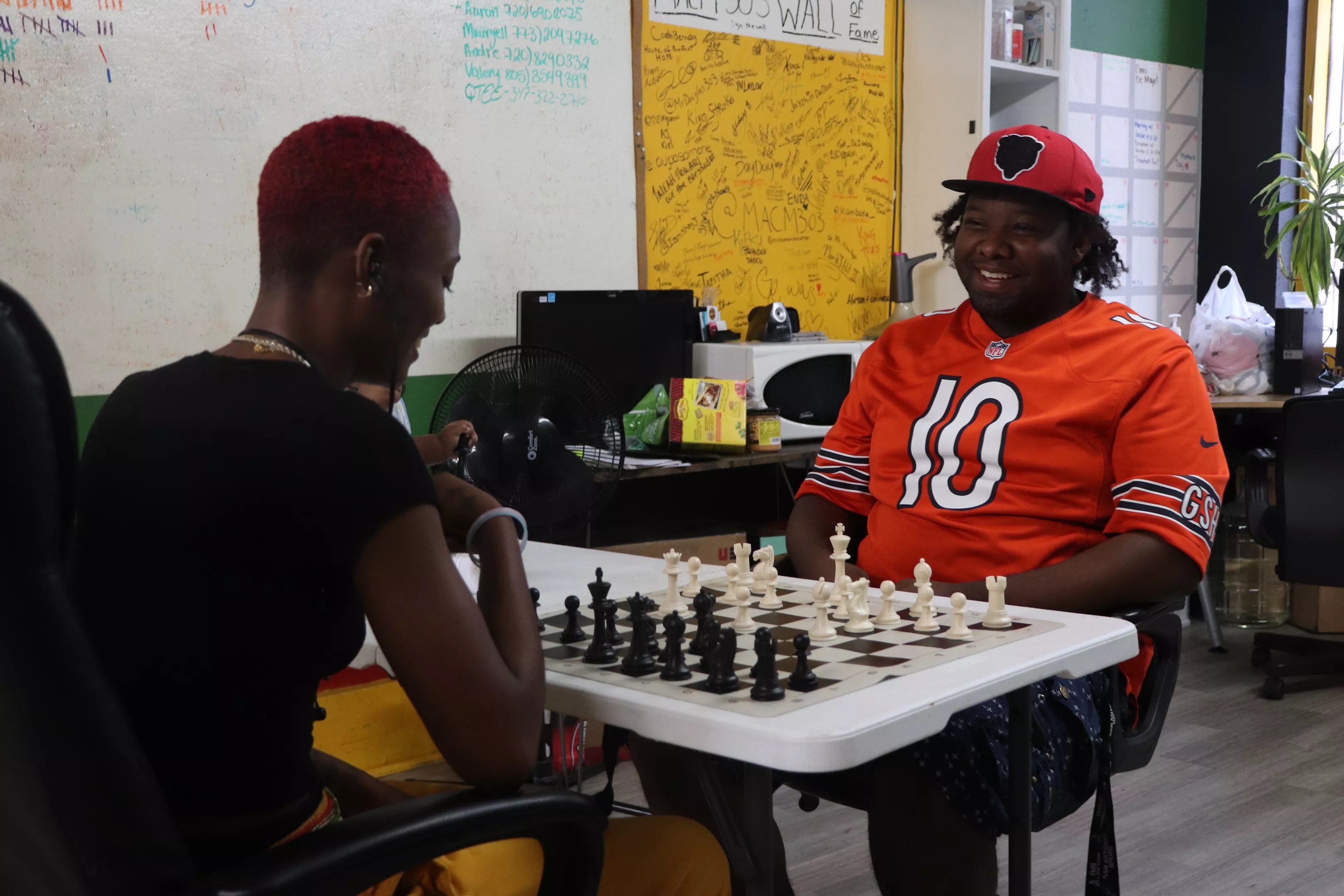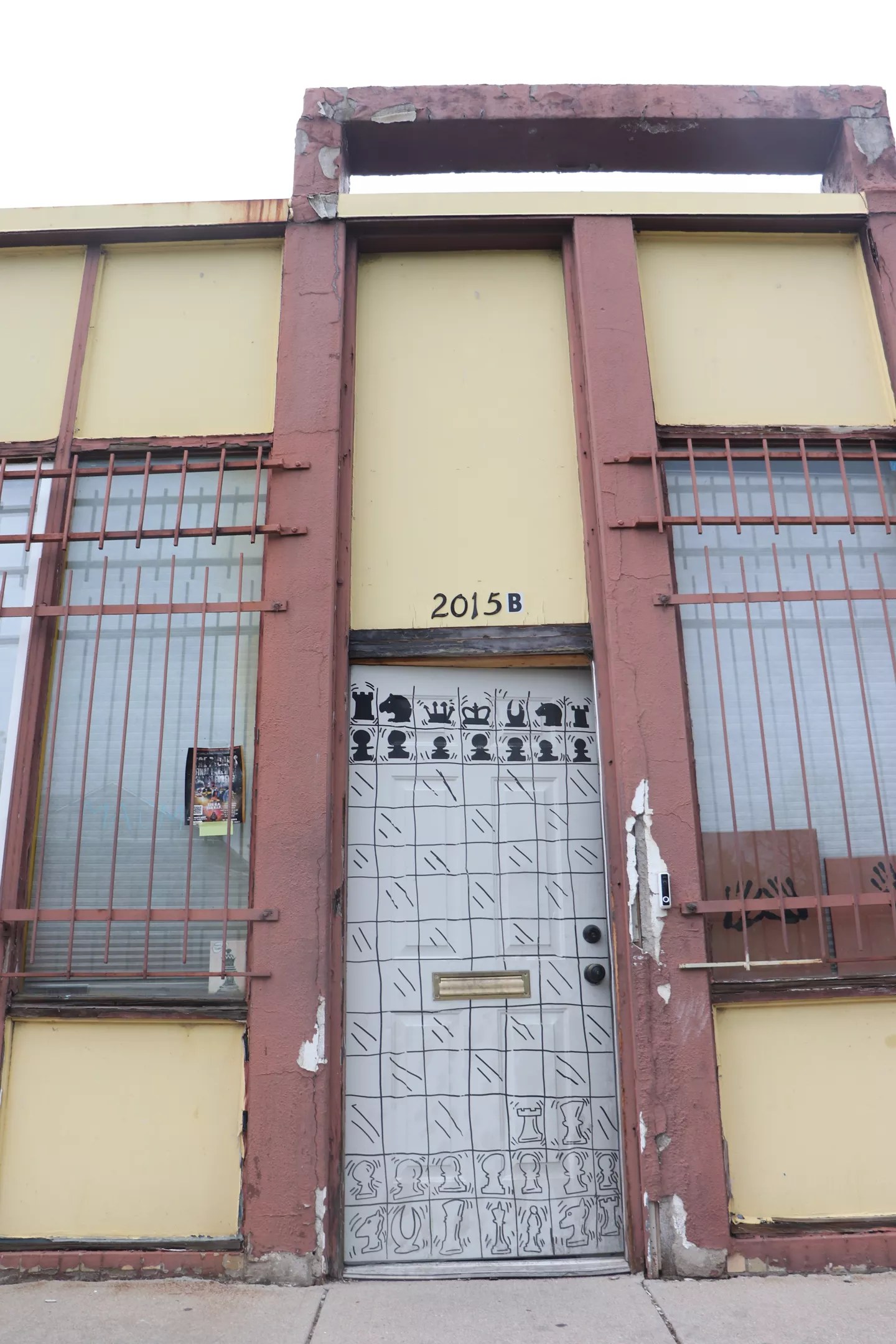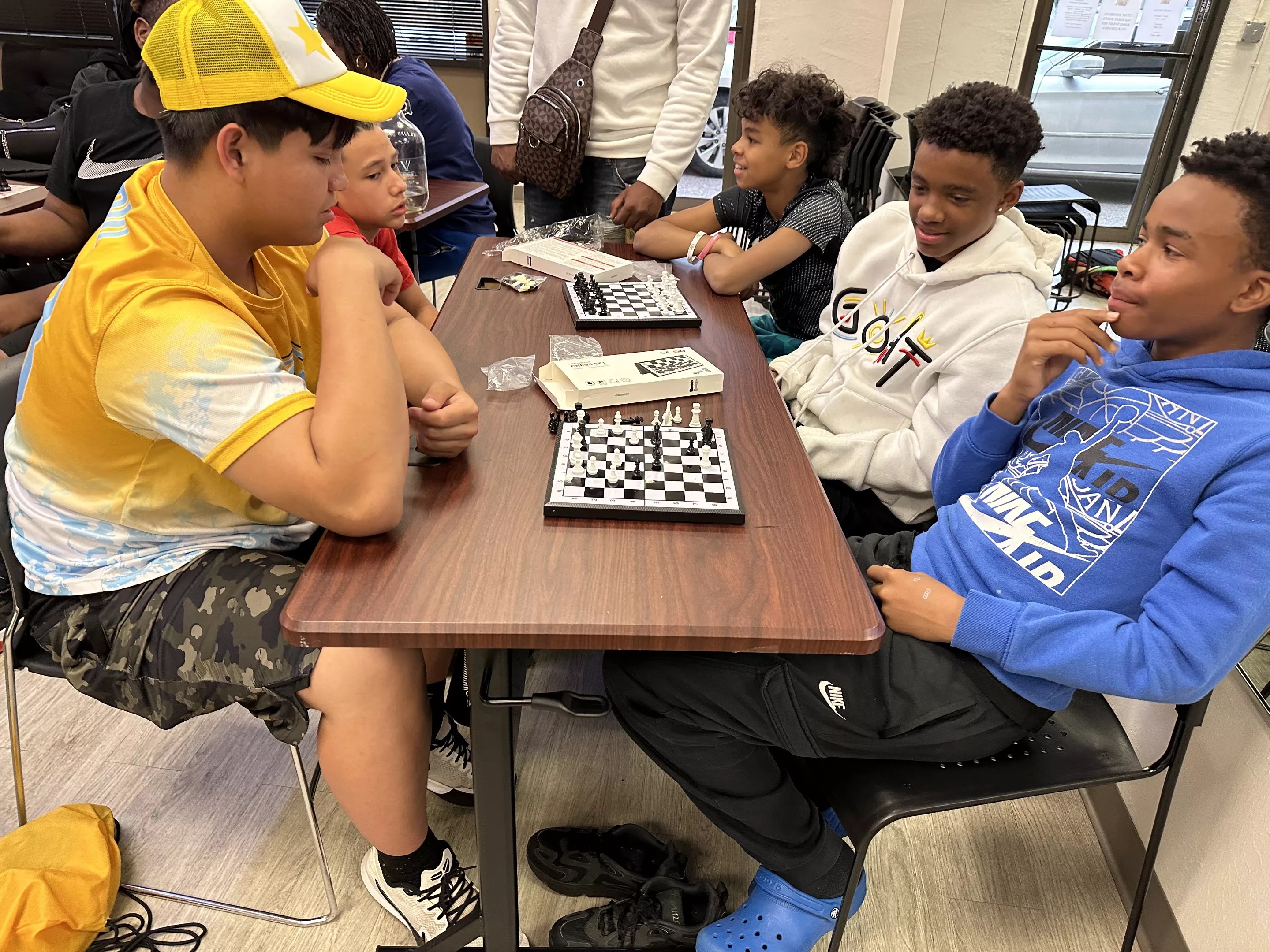
Mauryell Smith El – Make a Chess Move

Audio By Carbonatix
“We relate chess to life,” says Ge Wright, program coordinator for Make a Chess Move (MACM) – a growing east Denver-based nonprofit that provides both in-school and out-of-school programming and employment opportunities for kids and young adults.
“Our mission is to build a just society by developing tenacious learners, compassionate leaders and ethically driven critical thinkers to dismantle the school-to-prison pipeline,” Wright says. “And we do that through the skill set of chess.”
Wright describes how MACM uses the legendary board game as a practical and engaging means of teaching young people to see the bigger picture – how their choices in one moment can lead to positive or negative outcomes in the next.
“Every conversation that we have in regard to life, we relate it to chess,” she says. “And every chess lesson that we have, we relate it to the moves you make in life.” Like the playing board, for example.
“When we teach about the board, we teach that you have to pay attention to the whole board: the left corner, the right corner, the front corner, this front corner, the center,” Wright explains. “You can’t be too focused on what’s going on over here because then you’re going to miss something that’s going on over there, and you may get checkmated.”
Mark Hill, the MACM chess facilitator, believes that a person’s moves on a chess board can ultimately go hand in hand with life.”There are consequences to all your actions,” he says. “And the chess board is where you get to have those consequences without them affecting you personally.”
According to Wright, one of the popular sayings in MACM is “Make your next move your best move.” Another is “If you think better, you know better. If you know better, you do better.” As a result, kids learn to make every decision count as they play.
“The philosophy with chess is really getting the youth to have a different and a better understanding of thinking,” Wright says.

Ge Wright and Aaron Smith playing chess.
Benjamin Neufeld
Phillip Douglas, the founder of MACM, says the organization gives guidance and support to kids who often don’t have the opportunity to learn such lessons at home or at school. Social media influences and certain people in their communities can send kids down the wrong paths in life, he adds, and chess is a great way to get them out.
“They could want to be good, but there’s so much negativity that they’re fighting against,” he notes.
MACM was created by Douglas in 2012 after one of his mentees, De’Quan Walker-Smith, was killed in a drive-by shooting near Manual High School. He registered the organization as a 501(c)(3) in 2017, giving it the official status of a nonprofit.
Born in the mid-’80s, Douglas grew up on Denver’s east side – right near the main MACM space on Race Street and East 26th Avenue – and graduated from Manual. “If I didn’t get engaged in pro-social activities that happened after school, I probably would be dead by now,” he recalls.
“I was so enticed by that gang life,” he adds. “That lifestyle – the fast cars, the women, the money. That was something that we saw in the community. We didn’t see doctors and lawyers. We saw drug dealers, gangbangers, alcoholics.”
Douglas was raised by his grandmother after losing his father to alcoholism when he was eight and his mother to a drug overdose when he was fifteen. “She figured the best thing that she could do was put us into pro-social activities after school – or any kind of programs that kept us engaged,” he remembers.
If not for that, “I would have been like a real gang member,” he says. “Somebody would have probably killed me already.”
But at fourteen, Douglas got involved in YouthBiz – an organization that teaches financial literacy to kids through extracurricular camps and programs. After he turned eighteen, he continued working in nonprofits until he eventually started MACM.

The front door of the MACM office.
Benjamin Neufeld
But while things have worked out Douglas, life doesn’t always go as smoothly for others.
“I’m a few years older than Phil,” says Quincy Wedgeworth, MACM’s director of new developments. Both he and Douglas participated in YouthBiz programs that paid them to attend when they were in their teens. While the two started and ended up in the same places, they took drastically different paths to get there, however.
Wedgeworth says that YouthBiz “gave me that structure that I needed, it gave me that paycheck that I needed, [and] it helped me with my schooling, because they helped us with homework when we got there.” But after he turned eighteen, all that went away.
“Once that was done for me, I had nothing else,” Wedgeworth says. “This is my seventh year out of prison.”
Douglas also knows from personal experience the importance of making MACM a part of kids’ lives even after they’ve completed high school.
“I’m the only one in my family that didn’t decide to go that route…and when I say ‘that route,’ I mean the gangbanging, the selling dope,” Douglas says. “My older brother went through YouthBiz. My older brother learned how to play chess before me. I learned how to play in the seventh grade. My only motivation to get better was so that I could beat him. That was it. … He was a phenomenal chess player.”
Like Wedgeworth, though, his older brother ended up in prison after he lost the supportive structure of YouthBiz.

MACM kids playing chess.
Mauryell Smith El – Make a Chess Move
Rather than limit itself to an after-school program, MACM builds long-term relationships with its participants and gives kids the opportunity to stay on as employees to help grow the organization.
“Ge [Wright] has been in the program since she was fifteen, and she’s 24 now,” says Douglas.
Both Hill and Aaron Smith, MACM’s program coordinator, started at MACM as teenagers; now in their early twenties, they are among the first generation of MACM leaders.
The ultimate goal, Wright says, is for the program facilitators to always be young people. So her role will eventually be filled by a current MACM teen, while she either moves up in the organization or on to other things in life.
While chess influences the organization’s philosophy, it is only part of its programming. While the group holds open chess matches every Thursday, other programs include “Make a Culinary Move” and “Make a Civics Move.”
MACM is now gearing up for its ten-week summer program – a paid opportunity ($17.29/hour, four hours a day, four days a week) for young people to learn leadership skills while participating in summer camp-like activities. Those involved with MACM and/or the summer program are invited to apply for longer-term jobs running current and new MACM programs as the staff works to grow the organization and expand to other states. Ninety kids are signed up for the summer program, up from just thirty last year, Wright notes.
The MACM Instagram following has doubled since this time a year ago, and the group is doing more fundraising to meet demand.
“We’ve had youth reach out, we’ve had parents reach out, we’ve had school counselors reach out,” Douglas says. “Once they come in, they don’t want to leave. I don’t want to force them into a MACM career if that’s not what they want to be, but if a MACM career is something that you see yourself in, then let’s start working toward that. If you see yourself opening up your own business, let’s start shooting toward that direction as well.”
Addressing kids and families in search of help, he concludes: “Let’s get you the support, let’s get you the training, let’s get you the tools that you need.”